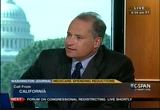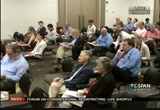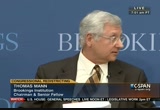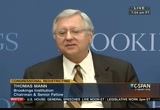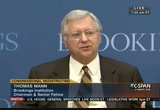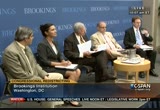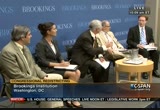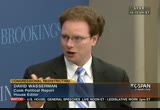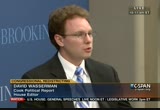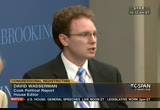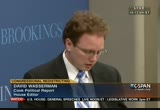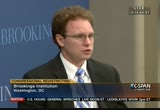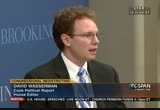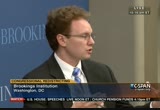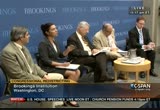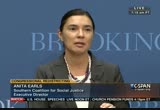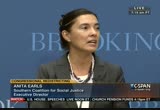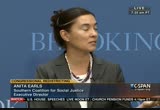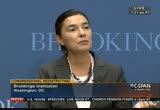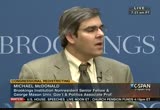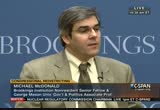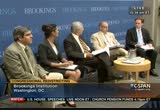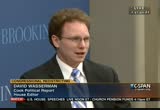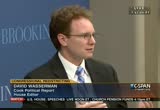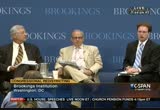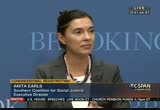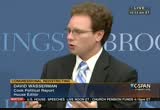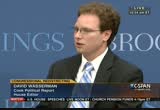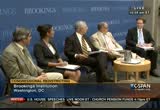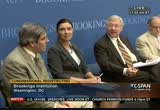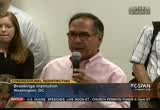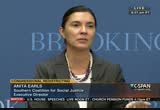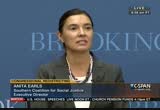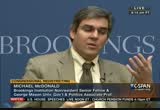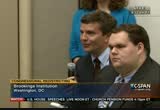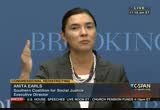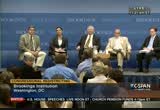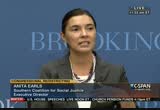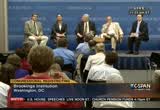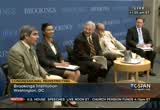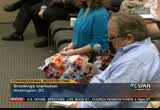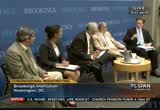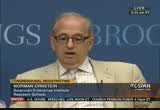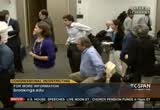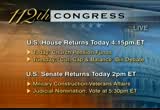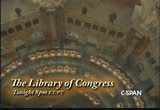tv Today in Washington CSPAN July 18, 2011 10:00am-12:00pm EDT
10:00 am
them to check into -- host: thank you, ann. final thoughts. guest: medicare does send itemized bills. the caller is actually correct about how medicare financing works. when you are working, you pay medicare part a, payroll tax. once you are on medicare, you pay the premiums for medicare part b. you no longer pay into part a. host: julie rovner, thanks as always for your time this morning. guest: my pleasure. host: we appreciate your calls. we will be back tomorrow morning as we are every day with "washington journal." for now we go live to the brookings institution here in washington. they are going to have a talk on congressional redistricting. the moderator is thomas mann,
10:01 am
senior fellow at brookings. several speakers. live coverage on c-span. enjoy the rest of your day. [captioning performed by national captioning institute] [captions copyright national cable satellite corp. 2010] we understand some of you are compelled to tweet revenue are. if you do, we know that is the event hashtag. i know you are shocked that i said that, but there it is. [laughter] >> it was written down. >> six months ago, we had a session here, almost to the day. today, we're going to take stock of how the process is unfolding
10:02 am
and with what consequences. why do people pay so much attention to redistricting? first of all, is a fascinating game, political junket we cannot resist. we can start talking about the midterm election before and continue on for years after as we try to discern the consequences of it. but much more importantly, they're genuinely high stakes involved in redistricting. certainly, it is relevant to party control of the house or democrats now need 24 additional seat gains to regain the majority. obviously, as it plays out in
10:03 am
state legislatures and local government, it has bearing on purchasing control their as well. it certainly is important as far as minority representation, a substantial majority of the population gains since the last census have been among minorities. the question becomes, will those population gains reflected in seats in the house and other levels of office? finally, redistricting has some bearing, disputed, to be sure, not dominant, of course, but nonetheless, important for competitiveness, for responsiveness, and for polarization. i think for all of these reasons, one has to a knowledge
10:04 am
the stakes of this process are unusually high. it is also important to emphasize the fact the u.s. is truly an out liar in the democratic world when it comes to the political control of the administration of elections. we will not talk about the eac today or we will not be talking about new state laws on voter id's, early voting registration. all of those are cut up -- caught up and shipped very much by the political and partisan struggles that exist in this country. instead, we will be focusing on one aspect of that, namely, redistricting. i think it is important because some of the new initiatives that have been taken on the redistricting process, perhaps
10:05 am
the most interesting and visible is the switch to an independent citizens' commission in the state of california, which is unfolding as we speak. david wasserman among others has reminded us how little turnover there has been in the california u.s. house delegation over the last decade. when we had three truly dramatic electoral swings between the parties, it simply was -- the state of california was insulated from that process. the question becomes, it does that can change? florida passed a couple of initiatives that have tried to impose discipline on the
10:06 am
process. right now, the swing state of florida has 19 republican members of the house and five democrats, as i recall. it may be the sharpest, strongest partisan gerrymander in the country. will these requirements approved by the initiative process have any bearing? we also have ongoing efforts to really increase the transparency of the redistricting process. in particular, an effort to try to give citizens involved in map making themselves. we, fortunately, have a wonderful panel to talk about all of these matters and others today. our plan this morning is to begin with initial presentations, then we will have a discussion among our panelists. finally, we will take questions
10:07 am
from all of you. i am going to introduce our panel in the order in which they will speak. we will begin with david wasserman, who was down here to my left. he is the house editor of the cook political report and responsible for handicapping and analyzing house districts. last year, david roche, authored, put together a volume called "better now district," which is the bible for this round of redistricting. it is a wonderful piece of work. we have all come to rely on it. david will get us off with an overview of where we stand, how the process is unfolding. then we will turn to my colleague immediately on my right, anita earls, the founder
10:08 am
and executive director of the southern coalition for social justice, a nonprofit organization in durham, north carolina. she has been a civil rights lawyer and has been deeply involved in the voting rights and in redistricting. she will speak on a topic of enormous interest. as i said, the population growth has been among minorities, but it is not yet clear that growth will be reflected in seats. she will give us an overview of how that is playing out in a number of state and how quickly we have or will be moving into the courts on the process. then we will turn to michael mcdonald who is a nonresident senior fellow here at brookings , associate prof. of political science at george mason university. he is someone who has been a
10:09 am
consultant to redistricting authorities, including the arizona redistricting commission who has launched through brookings and a.i. as well as the public matching -- mapping project, entellus the efforts to increase public participation and transparency in this entire process. then we will end with my colleague norman ornstein, a resident scholar who everyone knows. appropriately, he will tell us after hearing from our other three colleagues, what it all means for politics and policies. that is the game plan. david, kick ass off. >> thank you. thank you brookings for giving d
10:10 am
often under lip project. pundits, academics, cartographers, you name it. i am pleased to see some the innards out here in the audience. i definitely am one. redistricting is really one of the only arena is, not the only arena in which it is fair to compare lebron james and dennis kucinich. i do not think he will do any better in terms of winning. i really think examples of how redistricting affects our politics are everywhere around us, even if they're not necessarily part of the news articles that we read on major issues at stake these days. during the medicare fight, i do not think last to anyone could a predicted paul ryan from the state of wisconsin would generate so much attention in
10:11 am
coverage this year in terms of the fiscal woes facing the state. i think a lot of the attention on his district has been misplaced because democrats are saying, well, we have this candidate robert durham. allied of pendants, a lot of people you talk to the consulting world, very few who are credible would give him a chance of really taking it to paul ryan. but i do find significance in his district. if you plot out all house seats, the most republicans the most democratic in the country, on our scale of the voting index, guess which one is the 218th district? it is paul ryan's district. for me, the perfect illustration of why it will be so difficult for democrats to get to that magic number of 218 in the house. not only because of the personal
10:12 am
appeal, but before the recall elections in wisconsin, republicans are trying to engineer a plan that will make his seats in addition to several others, a couple more republican. redistricting is moving goalposts. another goal post moving is the ability of republican leaders in the house to corral a lot of their members, to get behind any kind of appeal on the debt ceiling. how this redistricting factor into this equation? it is not as difficult to pass any kind of package thanks to the line in the sand, 60 members of the tea party caucus in the house. that is only one of four republicans in the house. if you take a look at what is happening in redistricting, just about everyone will have to take on new voters and that means we have a slew of republican incumbents in the house beyond those just in the tea party caucus who are affected by taking on new voters and looking over their shoulders for
10:13 am
potential primary challenges. i think that is really making it more difficult for anyone to break from the hard line. with a status report on redistricting, done in 10 states. 33 to go, seven states do not need it because the only have one district. if we are keeping score of which party is more likely to gain or lose seats in certain states, or the riding his bicycle on the wall by this point -- were directing is basically on the wall by this point, and the rest of the states that have shown their hands thus far, democrats are likely to pick up a seat or republicans are likely to lose a seat in louisiana, maryland, nevada, washington. republicans are likely to gain a seat for democrats to lose a seat in georgia, indiana, massachusetts, michigan,
10:14 am
missouri, pennsylvania, south carolina, utah, and i'm leaving now north carolina and illinois because those are the big jackpot states that are really thriving each party's potential for gain. i have a question mark as to which would gain or lose. states like iowa, new jersey, and arizona. i am sure the five states we will talk a lot about this morning are illinois, north carolina, which are both party opportunity for partisan capitalization on this redistricting. illinois for democrats, picking up potential five or six seats. or four or five seats, republicans losing them. north carolina, republican gains and possibly three seats, depending on the legal challenge to the map the republicans are proposing. and in california, where i think democrats at the end of the table probably pick up two or three seats as the result of the
10:15 am
untangling of california's and competitive lines at the moment texas, where i expected to either be a draw or republicans netting two seats depending on the legal challenges we will be talking about. the wild card is florida. i am sure we will make that a big part of our discussion. there are two ways to measure how redistricting affects the big picture in the house. you could look in terms of the scorecard i just went over, which if you add up those columns, is going to end up ahead at the end of the day. i think it will be very close to a wash, depending on florida. it is possible democrats could pick up a handful from the process, which is surprising, given that republicans aren't some in the state legislative chambers and picked up some much control in 2010. but the other side of the equation is really, how much are republicans and to shore up
10:16 am
gains made in 2010? that is part of the question that has been more difficult for a lot of us in the pundit world to quantify. but one measurement that was suggested at real clear politics.com, and i appreciate this more than a lot of other metrics that have been thrown out there, it is take the mediant seat in the house. how far to the right is a move as a result of republicans in pennsylvania and ohio and michigan, states were they have control, shoring up a lot of the gains they made in 2010? i think the answer is, on balance, the 218th seed, the seat democrats need to win on average to pick up the majority in the house, will move to points to the right of where it is today. maybe from a district that is two points or republican to one that is four. republican. or twoublic get one points wider as well because the trend we see this for
10:17 am
underpopulated minority districts to expand into the suburbs and lock all brought of suburban seats -- and rob a lot of suburban seats. at the end of the day, candidates and campaigns matter. even after this process is completed, even after the new district lines, the ruby plenty of unintended consequences for us to talk about more than a year-and-a-half from now. i look forward to hearing what others have to say. a >> terrific, david. thank you for getting us off to a wonderful start. >> good morning. i am honored to be here and want to thank the brookings institution for inviting me and giving me an opportunity to talk about what i've been focusing on foot through this process. what is the impact on minority communities? i want to talk a little bit about that, the legal standards are playing a role. but a quick word about the impact of technology on the
10:18 am
process, and community involvement. to start with, how are things shaping up so far the interest of minority voters is very important to consider latino populations and they're looking differently than african- american population spread across the country, it is fairness say there are real concerns about the fact of huge growth in the latino population is not been reflected in the states where there are new congressional districts been drawn and as populations feel their voting strength is not being fairly reflected in those maps that are proposed and drawn. in texas, the mall deaths and several other latino organizations have filed suit. at last count, five cases in state court and seven in federal court already filed, challenging how the congressional districts have been drawn.
10:19 am
some of those claims are based on the fact the increase in the to the population in that state was reflected in the maps past. similarly, the plans and california put forward, and you may have heard, talking about extreme frustration and disappointment those maps are hurting the team of districts and not reflecting the strength in that state. i think -- with the latino population, i think it's fair to say they are concerned and ready to go to court because the plans past and not reflecting their voting strength. with the african-american population, i think the situation is a little different. growth is not across the board as great in the state, and i think possibly to a larger degree, have a little more history of having a majority minority districts drawn and being able to elect candidates of their choice. it is hard to say nationally
10:20 am
what is happening. a lot depends on whether they're in a state that is gaining or losing districts, which parties are in control in that state, and how the voting rights act works in that state. we have states covered by parts of the voting rights act and some that are not. i will give two examples that show some of the nuances when looking at the impact of the voting rights act in this round of redistricting. let me talk about north carolina for a minute. the first congressional maps proposed by a republican controlled legislature in north carolina at actually increased the minority percentage and both of the state's two congressional districts. throughout the state, african- american leaders were unhappy about that. the reason is because they felt it was actually training the influence from other congressional districts in the state. where they had a history being able to elect a candidate of choice and a district that was 42% african-american, they do
10:21 am
not want it to be what they called packed into a 50% black district. an interesting contrast is with the situation with latino voters in nevada, where there is a question of whether or not the will make this trade-off between being a majority in a single district or having a greater influence in more than one district. i said i wanted to talk about technology. looking at this process as it unfolds, i expected that technology would make it easier for folks to draw a map, but i think it is easier for public involvement in many ways. i never would have thought you could tweet about redistricting, but apparently you can read all the websites not only give you the ability to draw maps, but to give a lot of information -- get a lot of information and step up to date about what is happening in north carolina, the process of simultaneous public hearings
10:22 am
occurred throughout the state. you could go to one location for the first time and hear from citizens -- i think they had six to seven different videoconference sites. it was a very long public hearing, but they were using technology to really facilitate an increase public involvement. my third point is about public input. what i am saying is what is most in pipeful is. have groups coming together and try to draw unity plans are really tied nicklaus behind a plan that simply having individuals submit something in the legislation is not as much of a check of successes as we have nonprofit organizations and groups coming together behind a single plan and really working through the process. >> thank you anita earls,. michael. >> and ms. michael and i am recovering gerrymander. i have been involved in this
10:23 am
since the late 1980's. i have been a districting consultant in nine states. on the experience of being in the room and talking to legislators about their districts and hearing a lot of rights about what we were doing to their districts, let me -- let me to realize this is an arcane process the public is not engaged in. at the time in the 1980's and 1990's and in the last decade, really could not be involved in. the decisions were being made using technology that cost a substantial amount of money. did the bases were difficult to use. just the technology then was an impediment to greater public participation within the process, and also as a consequence of having restricted palette
10:24 am
participation, less transparency as well. -- restricted public of dissipation, less transparency as well the media had to take the state legislatures were that was only plan feasible and no other alternatives available. this is the way the world had to be. so over the last decade, working with a partner of mine at harvard, brookings, really wonderful advisory board of good government groups and by partisans -- people on both sides -- who see this process and know it is not a good system that we have in place. we move ahead and providing this technology to the public. something else that has changed of the last 10 years, talking about tweeting and other things, the internet.
10:25 am
the speed of the internet, the penetration of the internet. it is possible to run it redistricting software through web browsers. that is what we have done. we created software available on publicmapping.org, allows the public to draw their own redistricting plans. we infused the software with the data necessary to evaluate the plans being drawn as well, so you consider the political consequences are. it is a complicated process because there is live data to be managed, software, and so still there is a big hole to be climbed. tot we're trying to be -- shoulder that so the public can be engaged in this process. up until this point, we of supported redistricting competitions in virginia, michigan-which has concluded --
10:26 am
one in ohio that will start this week, and we're discussing potentially doing another competition in the state of new york. one of the ideas we have had is, let's get the public involved and offer prices to the best district that people can draw. have a panel of judges. tom and norm were gracious in being the judges for the virginia competition. that is one of the ideas. at a very high level, we could have a competition. you have to have organization involved with that. on another level, open up the process so either individuals or groups would have the same software and data that the redistricting experts have. we've been helping groups or individuals in states like massachusetts and new mexico, among other places, to draw maps and make some advocacy
10:27 am
efforts based on the maps they have been able to draw. and lower level would be the sort of, let's open up the process and allow the public to draw some plans but what have we seen from this? we have seen it is possible for people to draw up a legal redistricting plan. on the outset, one of the criticisms before we attend to this was, "you cannot do this." it was such a complex enterprise that it was not felt it was possible for a the public to do it, but only experts would have the ability and skills to draw the gulf redistricting plans. well, i can say from experience in michigan, the map dollars the second congressional map was drawn by a 10-year old. many said, that 10-year-old did a better job in the state legislature did.
10:28 am
it was more compact, more political fairness, more political districts. not quite as well on the county boundaries. it showed a 10 year old could do this. in fact, that is what we found, younger people really do engage in this but it is like a video game for political junkies. in virginia, it was more of a student competition led by faculty members across the state. we had 15 student teams at 13 of the state's colleges and universities draw redistricting plans. we had 55 drawn. some of those plans were submitted as bills. it is possible that a college freshman, a 10-year old, a senior citizen who is an advocate -- it is possible for
10:29 am
the public to be engaged in this process. the what we learned from this is that there are alternatives to what the legislature is putting forward that do better on some of even the constitutional requirements in some of the states. in virginia, many of the student mabs in virginia did much better and the legislature's maps on compactness, for example. we also learned but opening up the process broadly and having lots of eyes look at the problem, you can see new ways of approaching some of the issues they're very involved an important in redistricting, such as minority representation. one of the student plants in virginia showed an alternative way of drawing the congressional districts that enhance minority representation, essentially, the black caucus with this bill does the state legislature said this map was a good idea and implemented it and became the
10:30 am
concept for the proposed map for the congressional map in virginia. virginia has a divided state legislature. we have not seen a map that can pass the state legislature. it is possible one of these student maps may be adopted by a judge or elements of a plan may be adopted by a judge. there's a possibility we may cross that magical threshold, which i never would have dreamed possible, that we could see some of these ideas really put into affect. it is a whole different way even thinking about how we can do democracy in the u.s., or to have the public for dissipating and engaging, offering role -- participating, engaging, offering real possibilities. as i alluded to, we informed policymakers. they learned about these alternatives and took some of
10:31 am
these ideas to heart in a way in which they were drawing their districts. and also educated the public. it is one thing for the media to come and ask one of us talking heads about redistricting, but quite different for them to go to a student or 10 year old and ask them about how they would approach redistricting. it changes the story from being about process of putting a human face on it. we had wonderful media coverage of these efforts both local and national. finally, as i said, we have shown there are these alternatives that we can form -- inform the policy-making and show there is a better way of doing this. as we come out of this experience, i am hopeful seeing how we have opened up this process that we can have a real discussion about what these policy trade offs are and how to go about implementing them 10
10:32 am
years from now. >> thank you, michael. norman ornstein. >> it has been a real pleasure working with michael and his colleague. it tom and i had quite an expense judging those virginia plans. tom is the simon cowell. unfortunately, that makes me the paula abdul. i want to step back to start a bit and look at or think about a couple of bigger questions. this really does become, more of a wonfest -- wonkfest. spelled 'know' backwards. at the root of this, beyond the competition's, the viciousness, what it means for partisan balance is a broader concept of
10:33 am
representation. one of the worrisome elements of the way we have been during redistricting -- this was amplified a few years ago in texas under tom delay when at this twice in a decade, creating a different presidents. but if you think about links between poachers and the representatives, even beyond what has become -- the voters and their representatives, even beyond what has become the norm, it becomes much more difficult for the voters to develop any kind of link to our representative when there is turmoil from one round of redistricting to the next. you really do not know what's kind of representative you have, whether you have the same one, and whether you will feel any sense of community around you because of the convoluted lines that are drawn. i think that is becoming more significant problem.
10:34 am
at the same time, it is interesting to reflect on how the process in many ways has changed to reflect the changes in our politics. the last four ways, the 1980's, 1990's, and now are somewhat different from what we saw in the past. politicians natural want to maximize their own advantage. in the pre-printed campaign era, the scene was much more the incumbent protection one. the parties would tend to get together more and say, you protect your guys and will protect hours. of course, there is some of that depending on the state and the dynamics and who has control, but it has become much more vicious. in an earlier era, it was more about solidifying the goal posts. as david said, now it is about moving them and moving them as much as you can print that is not just the permanent campaign and the high stakes. the stakes growing higher, as we see more turmoil in the
10:35 am
politics. it has been amplified by the supreme court, which is clueless, to be truthful, about the real world, especially when it comes to this area, as they have through a succession of decisions, basically focused on one person, one vote. the way in which they did so is the height of absurdity because they have rejected districts that it down to a tiny number, a little more than a handful of variation of 600,000 people. but all based on census data that is antiquated before the ink is dry on the census forms because the population movement. so by doing so, especially in this area of powerful computing, they have made much easier to do this vengeance to community of interest, and to county and other kinds of lines, to compactness and other things. it is becoming even more
10:36 am
research because from the beginning, we have drawn house of district lines within states. and because of the white population variations now, in particular because we're having more and more states, smaller states, losing population, the one person-one vote does not work very well if the of the state that has a representative, but a population of 300,000. and then if you try to move the districts around, we'll end up with districts that are a million in population. how you can reject a plan because it varies by 100 people out of 600,000, but sit back bluntly why you have one district that has a representative three times as powerful in terms of the number of voters as another is something only anthony kennedy knows in his own mind, i guess. it adds to our challenges. let me add, one result of the
10:37 am
way we're doing the redistricting now and the way some of the states are playing out, and the wide variations we're seeing, even as we see some interesting developments in places like california and florida that are trying to move it out of some of the but -- some of the vicious politics that occurs between the parties is, i am afraid whichever party gains or loses this time, pushed to the sun, one result will be more polarization. if you look at what is likely to have a north carolina, for example, you have three democratic representatives and very serious jeopardy right now. they're all among the remaining drilling group of moderates to conservative blue dog democrats. if you look for a lot of the states, they are often the ones who will be on the chopping block in states where republicans will be able to gain a little bit more leverage. it is not as if we have not
10:38 am
republicans left who can move under the chopping block, but as we see the council edification of party control that david has been talking about, what it will do and many of these districts is put more premium on the primary as the one place for a challenge can occur. it is in those places we see this kind of electronic that either nominates more conservative candidates or takes the representatives who are there and pushes them in a different direction because they have got to respond to a smaller group of purer voters. at the same time, we will end up with many fewer heterogeneous districts. this process we have been describing as far more than that of moving many of these republican districts to be even more white than they have been, which is wider and wider over the past few waves, anyhow, and pack a minority of voters. although, there are some
10:39 am
exceptions come into their districts. homogeneous districts means there will hear an echo chamber when they go back home. as we can see with the dynamics of the debt limit, that echo chamber, which means they you cannot feel any fiduciary responsibility to represent people whose views may be different from your own because they're not part of your district, makes it harder to find a center or come to an agreement. those are some of the reasons why, and i have joined with michael and mika to try to raise some of these other areas that the court has basically pushed to the side from compactness to communities of interest to even competitiveness, to try and figure out a way to alter the dynamic or get the public thinking a little more so that we can have whatever occurs in a
10:40 am
fight in which political figures are naturally going to try to maximize their own advantage, either personally or for their parties -- that is just the nature of the beast -- but to try to keep from having the worst other elements that can emerge from this process taking over even more. >> thank you. that last point to is making, underscores an important distinction that i think we should keep in mind. you'll often times here people argue that the reason we have such extreme partisan polarization is because of gerrymandering. that is wrong. it has contributed, but it has not been the dominant factor. but ironically, gerrymandering has become more of a consequence of polarization. that is, it sets up the state in a way that leaves -- leads to an
10:41 am
exacerbation of an underlying condition. so the efforts at reform are trying to break that dynamic in some way. in that spirit, i would like to turn our conversation to california and florida, if we could. these are sort of two experiments in reform. one with new criteria imposed on the process, the other with a new process replacing the old one. david, would you pick us off on that? you've been watching sort of california. earlier, he said it is like watching paint dry to see the commission at worked. share that with us. >> last tuesday, we have a special election in california to replace j. herman. the winner was a former l.a. councilwoman and one that tuesday night.
10:42 am
wednesday, the commission put out a visualization of a hypothetical district or perspective district that would throw janice han into a district with waxman. welcome to congress on tuesday, now run against waxman on wednesday. welcome to california. watching california's commission has been really amazing for some who focuses on insider congressional baseball, if only because this is a brave new world. it is the largest laboratory of reform in the country in redistricting right now. redistricting california is like trying to partition a melting pot. given perhaps the most complex redistricting job in america, giving it to a group of people who were selected in part by lottery and in part by sending
10:43 am
in their resumes of how nonpolitical they were. the result has been 14-member citizen commission that has earned plenty of criticism from the outside, for example, picking a mapping from the republicans argued had ties before to democratic planning perspective. but i give the commission in watching their meetings, even if it is like watching paint dry, higher marks than most people would have guessed they would give them early on in the process. watching them work together as a group of 14 and very tedious meetings to come up with new maps is very impressive and the terms of the town of collaboration since we of other commissions across the country -- we have seventh congressional redistricting commissions. this is really the only one out of the seven that does not have some political component in the
10:44 am
process watching over their shoulder or pointing the commissioner -- there really are accountable to no partisan overlord in this process. in part, i think your cooperation is very refreshing as they succeed in untangling california's free and competitive one in generating even five of 10 congressional elections. yes, there will be 53 very scared incumbents at the end of the day, but i think california could be held up as a model of reform, this is nothing of the potential of political sway in democrats or republicans favor as a result. norman ornstein said he thinks cooperation may be un-american given the climate in washington these days, but i think it will be of very useful example of how putting the power to redistrict into the hands of people who are closer to being average
10:45 am
citizens could really have beneficial effects for both the competitiveness of congressional elections, but putting the power back in the hands of the people to selector politicians instead of the other way around. >> michael, what do you think of the criteria california is using that is politically blind and respects? they do not know or the incumbent resigned spread the last resigns. some have argued, that is the way to go. ignorance is bliss. others say, to achieve political fairness, you need to take politics into account. >> i am an academic, so i cannot argue with myself. [laughter] i will take the argument against the commission for just a
10:46 am
second. what this commission is and what david said that by his example at the beginning is, term limits by another name. you're just want to shake it up quite a bit and see were the seats fall. if you're lucky enough at the end of the music to be able to have -- fit in a seat, great. you get to serve another term in office. if not, well, here is your exit. they're people who say, if he really wants -- if you really want to have term limits, you should do it rather than through redistricting. they also say these members, they are the people who best know their district. they are the ones who are best capable of drawing a district that will reflect the interest of communities for their districts. now, again, i am an academic and
10:47 am
can argue with myself. the counter to that, if we can just get one good set of districts that fall some good criteria, then i can have this problem again because if you are following political boundaries and respecting kennedys and doing other things, that will be the baseline 10 years from now we're in, as will want the districts to be drawn. if we could just get over this hump once of putting in place could criteria, then i think in the future, there'll be much less politics involved in this because it will sort of just be a mechanical process. this is how many other countries around the world to this. they're just following criteria. the criteria themselves, i am more than an advocate if you want partisan fairness to be one of your goals, he should have that explicitly in your criteria and should not just blindly say, if i am following county boundaries or other committees or drying compact districts that
10:48 am
somehow magically, fairness or competition will emerge from that. that may not happen. in fact, good evidence to suggest if you follow the sort of neutral criteria, you get a slightly republican gerrymander in most states. the fact democrats are inefficiently concentrated into urban areas. still, if you look at the case of florida, what is likely going to happen if you get a plan that is respecting the state constitutional requirements that voters adopted in 2010 -- by the way, they had to get 60% majority. the legislature changed the bars trying to avoid having these images to this past, and they still got over the magic 60% instead of 50%. the voters of florida and want to have some limits on what the republican legislature in
10:49 am
florida can do. it is a really great experiment there to see if those limits can be enforced and if they can be meaningful. the one thing we would say of why we may have some expectation, at least for the state legislative redistricting that may be enforced, the state supreme court in florida has an automatic review of the legislative plans. there is some government veto in florida. it is a stake supreme court review. they can look at the will of the voters. the state supreme court to make a judgment as to whether the state legislature did a poll on the standards the voters imposed. >> interesting. anita earls, we pick up on the florida case? this has been interesting. it is one of those cases where i believe two african american members of the house were really opposed to this change. it reminded one of a coalition
10:50 am
in the past of minorities, sort of republicans resisting, creating some safe majority minority districts but in the process costing democrats overall some districts. how is that played out down there? >> there is litigation. >> that is the american way. [laughter] >> it is an example of sometimes the quest for competition coming in conflict with the quest to fairly reflect and empower minority boat tours. i would also lay some of this in the lab of the court. -- play this in the lap of the court. maybe that is one of the big differences, and least in the last round of redistricting, there was still a sense that
10:51 am
maybe if we went too far extreme on partisan gerrymandering, a court would bring us back in. but now the courts and ability to reach agreement on what a standard should be an addition be implemented, i think has just left line drawers, whether they're commissioners or legislators, open field to kind of do whatever they want to. what i would say about florida is that while i think instincts about saying should not be partisan driven, i think voters around the country will generally agree there should be fairness to everyone and that kind of encapsulates a general sense people have about what our democracy should embody, i think they went about it the wrong way. i think saying you have to be blind to data that is out there does not help. i think they need to be specific about how you meet -- what is fairness? what measure you use? i think the example of one vote
10:52 am
jurisprudence is helpful. yes, and getting down to one person is, meaningless, but it is a standard. it is clear. it is a bright line you can follow. i think and the partisan gerrymandering arena, we need to do the same thing. we're not going to find a perfect balance of what data we should use, but should have a standard that is clear and and lamentable and use that to constrain what is happening. what i see in many states, the voting rights act is being used to try to rein in partisan gerrymandering and that is not its purpose and not working well. >> one of the difficulties of reform state-by-state is that you make it change in some states that reduce the amount of
10:53 am
partisan gerrymandering, but it is -- its national met affects me work against the other party, or that party itself that makes it exceedingly difficult to approach all of this with a sort of good government perspective state-by-state. the fact is, the real serious ideological partisan party interests that are shipped by all of this critic david, to agree with that? >> i think what she said about voting rights in used to justify reining in partisan gerrymandering, i think in any case the voting rights act has been used as justification for partisan gerrymandering. what we're seeing, at least in
10:54 am
the democratic party, is a split we of seen the past couple of decades, for example, between those wanting to maximize the democratic cleaning seats and not the number of the african- american majority seats. i think that is a rough fascinating part of the equation. we have already seen -- i think that as a fascinating part of the equation. we have seen word republicans ended a couple of votes in the state house to pass the republican redistricting plan to eliminate a suburban st. louis democrat. the chairman of the congressional black caucus leaned on a couple of african- american state representatives from his house district to vote for the republican plan so that he could get a better district on the other end of the state. there have been conflicts between democratic strategic
10:55 am
spots in washington and african- american lawmakers could the- strategists in washington and african american lawmakers. i think that will really play out. it is not always clear-cut. in florida, democrats would love to unpacked the third district. some use to call it the wishbone that extends from jacksonville to orlando, and with three democratic leaning districts in their place. but that divided the democratic party i it makes it easier for republicans to capitalize on the split and get their way in court. a >> it is an interesting dynamic that tom and i saw and a similar vein when we return, the reform in congress. you take away any piece of jurisdiction from a committee or subcommittee chair, and it is like ripping a child of their arms. they will absolutely fight to the death. parties face this problem all the time. that you can take a district that is extraordinarily safe and
10:56 am
make it non quite as extraordinarily safe, and that representative will do vengeance to the party's goals to keep it that way the missouri example is a good one but it is not as if emanuel cleaver were in trouble. this was someone who was going to coast to victory even under the threat of an enormous political storm, but was willing to throw a colleague over the side just to make it even safer. it makes this even more of an interesting dynamic for the wonks in the process. you cannot say a party is going to take the reins of power and the state and always be able to do what they want. it is always a balance. you try to quit a few more competitive districts, and you may put a few of your own -- you can try to make a few more competitive districts, and you
10:57 am
may put a few of your own in jeopardy. large political ties can overwhelm that. republicans may very well in some cases be able to add water to points -- add one or two points to an advantage of these indian districts. if it turns out they overreached badly on medicare or on the threats to shut down the government and you get enormous public backlash, that may mean members lose by three points instead of what otherwise would of been five or six points. we just need to have a little humility when we try to project ahead in terms of what this means. >> this sort of stronger party voting on the one hand makes it easier to draw sort of partisan districts, but it also makes a potentially more vulnerable because to get wide swings that are based largely on reactions to the political parties nationally and get a lot more turnover. as you're talking about the missouri case, i was thinking
10:58 am
the opposite experience in virginia where bobby scott said, hey, take away some of my minority constituents. i do not have to have this height of a percentage he is already below 50%, as i recall. he is saying, you could create a second minority districts with many 40% of african-american constituents. so it works in a variety of ways. before return to questions from the audience, i wonder if we could have a little discussion about texas? texas plays such an important role in our hearts, going back over time to bank its history in gerrymandering, i gather the plan drawn up by the republicans in this case works rematch against the interest of the new
10:59 am
hispanic population. would someone be willing to sort of lay that out? have you looked it that? you're probably very much involved in the cases. >> it is true that mall deaths introduced in the legislative process maps that would give them, i believe, an additional two congressional seats in the enacted map, and they have filed suits in under section 2 of the voting rights act, it was a violation not to draw those districts. i believe the officer introduced into the record maps that would add the district would elect a candidate choice of black voters in the fort worth area, not majority black, the combination of black and latino voters elect a candidate toys of black voters. that is what is at stake in some of the litigation. there other types of legal claims being filed in texas as well. >> david, how did they do it?
11:00 am
what are those -- what do those maps look like where by some republican gains were realized in a potential latino district was not created? where is the action? > i could play when a man wih the map all day if we had it, but you might be better asking an abstract artist to decipher what the texas draft looks like on the republican side. i think there is no question latinos have been grossly underserved by the redistricting process. even from a non-partisan point of view, the texas plan is a pretty egregiously clever way of diluting democratic voters, but also latino voters.
11:01 am
particularly, in the significance of voting rights cases, in the dallas-for the worse -- fort worth area, where you have close to a 40% hispanic district, and that community has been split seven different ways under the republican proposal. that is clearly to work -- elect republicans in suburban dallas and fort worth and deny democrats a seat in that central area. you could also make the case that you could draw additional majority seats in houston, although there is some dispute over whether the two houston seats would be over a certain age over the latino population, but you could certainly draw another latino district in south texas without putting up austin
11:02 am
three ways. it is exactly the map that we thought republicans might drop, with one exception. i thought they would draw a latino district in dallas and fort worth to avoid a lawsuit, but also to shore up a lot of their members at pushing them out from the suburbs. instead, the republicans and texas have gone one step over which could expose them to a suit that could do away with the map. >> michael, do you expect many plants at the congressional level to be ultimately written by judges? if so, is there an opening for the public mapping-kind of
11:03 am
activities to have an influence at that stage? >> courts prefer not to get involved in the redistricting process. their first instinct when there is a constitutional defect with a redistricting plan is to have redistricting authority to try again. here we have identified these errors. you have a chance now to rectify those errors. however, you could have a map taken from the court, ideas taken from the public. those will probably be put back to the legislature to fix, if there are issues to be fixed that were discovered. some more like virginia or new york where you have a divided state government and you cannot get a congressional plan passed.
11:04 am
there, the courts have to step in. you cannot delay redistricting -- except we learned in mississippi, it could be possible. but normally, you cannot have an election go by without redistricting. in some states, there is an opportunity where a state permit is divided to do this. i did want to comment on something. in the dallas area, they fragmented the latino community, the republicans come in order to gain additional representation. it is a short-term strategy for them, in some cases. if you look at the census data, that is our growing population in texas. you may be able to get a map out favorable to republicans in a
11:05 am
few districts, but if you look at these populations and project out what is going to be happening 10 years from now, i do not expect texas to turn to a blue state, but some of these districts may. it is a short-term strategy. i do not think it will stand up through the decade. that is surprising to me. usually, you want to draw up districts that are solid through the decade so that you can maintain your majorities for a longer time. >> in terms of the courts, -- one of the reasons courts are reluctant to get involved in this -- they have no expertise. courts would have to find someone to do it.
11:06 am
we are now seeing the public mapping project meeting all of the criteria, and in a powerful way. this is the case in virginia, for example. if you end up where a court has to make a decision, it will make it easier for them, and it will be a better plan. now it is your turn. we have mics. we would like to identify yourselves and ask a question that is shorter than the answer will be. let us start all the way in the back. >> my name is jeff weiss, a fourth decade redistricting recidivist. my question goes to litigation, where this whole process is going down the road, later in
11:07 am
the decade, in the courts. several states to have section 5 voting rights act preclearance have filed for preclearance in federal court and in the justice department's. there has been a notion among several republican attorney general's that they would play politics with redistricting, of course, unlike any other previous republican administration. i think the voting rights act coming out of texas or florida will be the key issues when it comes to litigation. a question on the politicization of redistricting, or whether the courts or doj are better or worse, a strategic advantage? >> just to throw a bit more uncertainty, we have more challenges to the constitutionality of section 5,
11:08 am
pending in the d.c. courts. what does that mean if, in two years, the supreme court finds that section 5 is unconstitutional? there is a lot of uncertainty around the voting rights act. i was an assistant attorney general for civil rights in a prior administration. i did preclearance work. what i will say, from a public point of view, if he go to the d.c. public -- district court, it makes it harder for people to comment on the plan to have a role. the justice department process at least allows for pretty easy public comment. if it goes to court, you need legal representation, it becomes a different process. there are so many other different things about the way the process proceeds, my point of view is that we continue to
11:09 am
advocate for what we think the law says an will abdicate in whatever jurisdiction we need to, but there are some important differences. >> in virginia, i served as a consultant to the governor's independent redistricting commission. i was actually question by doj about redistricting the state legislature plans. the governor vetoed one, they made minor revisions, and then they said that of to doj. so we have one redistricting plan from the republican house, and another from the democratic- controlled senate.
11:10 am
questions were primarily about the republican plan. they were fine with the democratic plan. of course, in my work for the governor's commission, i drew up an additional minority districts that the legislature did not adopt. in the state house, there was some language in the voting rights act which may have provided an opportunity for the department of justice to require the state to add another district. they did not do that. instead, they looked at the three districts that the democrats had drawn down, in terms of voting age districts, and they were not sure if those districts would continue to be affected, to choose african- american candidates. that is exactly what was required under section 5. that is what they looked at. given that there was this
11:11 am
opportunity to play politics with redistricting, the department of justice here had won an opportunity and had correctly applied, in my view, section 5 requirements. ultimately, deciding that the state plan was acceptable. yet again, a democratic plan was the subject of scrutiny, not the republican plan, but at the end of the day, they accepted both plants. >> my perspective from a political standpoint, where with the justice department pickets battles? i think we know a little bit of the answers so far. it does not mean a raft of new african-american districts in the south. i think the battle is really in california and florida. >> department of justice can file litigation under section 2.
11:12 am
if we are going to see them play with politics, that could be the vehicle where we see the department of justice being enacted, supporting this litigation being found in some states. but it does not team to me that section 5 will be their vehicle. >> 40 of bipartisan policy center. the question about competition between different values. if somebody could weigh in on the conflict between latino voters and the emerging asian voters as well. looking for greater representation, having conflicts in the commission. second, having criteria to make more competitive districts, representing communities of interest. certainly, those two are in conflict, to some extent, but has the commission given guidance on how to resolve this
11:13 am
conflict? how might it have been more competitive? what is the way the commission makes those decisions? >> competition is actually not a requirement in the california constitution. what is thought would happen, instead of dividing up these communities in a way to work against competition, drawing on a neutral criteria, you are going to see more competition emerged from that. that is what we expect to see out of it. it is sort of like competition emerging from some of the criteria not imposing competition as a requirement. however, arizona does that. washington, too. if you want to -- and there are some states that do this -- you
11:14 am
could explicitly put this under a state constitution. >> i think that is a fantastic question and gets to the heart of what is facing the commission. the most difficult job they have, how do you address competing minority interests? for example, if it is only possible to draw heavily black or latino districts in certain areas of the state that are right next to each other, but do you do to maximize each ethnic group of's representation? the first draft that we saw come out, pretty regular lines. i thought it was a good map that greeted 3 heavily-represented latina seats in the l.a., and two heavily black seats in terms of eligible voting population.
11:15 am
when african-american voting advocates saw that it was possibly reducing the number of seats from three to two, and they got spread even better. but as latinos constitute more of the population, they ought to be receiving more share of minority seats. coming under the pressure of ethnic and racial interest groups, i think, has caused the commission to take a step back from their initial draft. what we are seeing is the goal of creating compact, understandable lines is at odds with the goals of some interest groups of maximizing minority representation. that is the thorniest issue of the commission in the final months. >> i am a student at the
11:16 am
university of wisconsin. i am not an expert on this topic, so sorry if this sounds like an amateur question. you said the courts have no expertise on this issue. i am wondering what could make it better, more public input into drawing these lines? it sounds like there are a lot of problems. how could we improve them instead of taking them to the courts? >> go to publicmapping.org -- [laughter] they will be adding something on wisconsin this week, so you can try to add your own lines. >> one thing i want to say, we need to make technology available to members of the community. have them draw the maps as groups. in north carolina, we did it several different days.
11:17 am
people in different parts of the state came on different days. people in the western part of the state know their area. when they came together, they things.stood a few there are always tradeoffs to meeting the redistricting country area. but they were also able to learn what was possible. a lot of the critiques of redistricting are not knowing what is possible. we got people involved by doing more than just coming into a public hearing. >> anita makes it a good point. states and commissions, state legislatures, their version of public participation is to hold
11:18 am
a hearing and have people come to the hearing. they have not really engaged with their constituents to find out what do they think their communities are? it is something that emerged with meetings with the virginia independent commission. people come out and described their communities. we could do a lot more, we really could. the technology is there, the opportunities are there. we need to think how we are engaging the public and have a discussion about what the communities are, well in advance of redistricting. not once we get the census data. that is too late. you cannot have a full discussion about what people feel their communities are and how they're representational needs can be met. as we think about how we can
11:19 am
improve on this 10 years from now, a modest proposal would be, can we get better discussion about how to best serve the representational needs of communities within a given jurisdiction, state, well in advance of redistricting. >> the wisconsin case is interesting. you mentioned paul ryan's seat. if that is turned over to the democrats, what would 22 that redistricting? >> this is all about timing. in wisconsin, could we see that map overturned? well, it is very hard for democrats to make the case they can do anything about it after it were to pass they do not have the governorship. it is always difficult to undo
11:20 am
something once it is done. the public only has so much appetite for dealing with redistricting. once they see the matter is resolved, it is time to move on. >> we have three weeks until these special recall elections. >> in illinois, we have already seen them do it once. if they can wait a couple of weeks, they could get a different outcome. another interesting thing that is going on in wisconsin, traditionally, what happened in wisconsin -- and this is by state statute -- all of the present boundaries are done first. then the state draws its legislative and congressional districts out of its wards. they have completely up and in that process this time.
11:21 am
now the states get to move first and then the precincts and localities can move after. there are lots of opportunities here, i think, for litigation. >> it is breathtaking to contemplate the political control of a process. nowhere else is it more controlled. >> good morning. we established a political pac in maryland, as a result of the growing minority population. about 30% african-american. i wanted to ask a question specifically about latinos. some of the concern we are having with drawing maps --
11:22 am
utilizing the test. could you speak to that, specifically related to immigrants? >> for the supreme court has recently elaborated under section 2 of the voting rights act, in order to make a claim on behalf of a single minority group, you have to show 50% or greater in the district looking at voting age population. some circuits have said there has to be a citizen-age boy and populations. there are questions around the reliability of citizen voting age data. it is not a new districting data set. there are questions that arise around what data are you looking at to decide whether you can draw a district? beyond that, questions about can you define a district if you are combining two minority groups,
11:23 am
are they politically cohesive? what is the history of politics in the jurisdiction. latino voters, are they put it -- politically cohesive with other minority groups? there are a lot of issues. >> a question all the way in the back. yes. >> scientists and engineers for america. i wanted to raise a point and ask a question. one of the problems in the minority district california group, in many areas, you had dissimilar minority groups. for example, correa town in a los angeles -- korea town in los angeles it is part of the two african-american districts.
11:24 am
asian groups are very dissatisfied about that. that is a rising group. the other thing is, you are all assuming, contra the practice to texas, that these district boundaries last 10 years. what makes you think, notwithstanding various indictments, that anyone is going to let these districts go for 10 years, if they begin to experience when you were suggesting, in terms of substantial population movements. >> there are a number of states that have prohibitions on redistricting. texas is not one of them. the supreme court said there would only be requirements for redistricting once a decade. there are some opportunities in some states for redistricting. and it was not just texas. georgia, new hampshire, south carolina.
11:25 am
so i expect we will see redistricting over the next decade. it especially -- especially if we see these submitted a swing votes. if democrats take control of the state legislature, i would not be surprised to see a democratic plan replace the republican plan. if republicans can take control of the senate in virginia, i would not be surprised -- instead of a court order for 2012 -- to see a republican plan put in place for 2014. there are opportunities to see redistricting across the country. probably the biggest prize will be in new york. can take control of the senate -- there is a good chance that they will after this redistricting. we could see it again in congressional districts in new york. >> is that good or bad?
11:26 am
>> i think we just need good districts in place to begin with, so we do not have to do it again. it is consistent with the view in washington, too. you take control of a chamber of the house, you repeal laws, and you do not allow laws to be implemented in certain ways. politics is so intensely partisan now that it affects laws in the past, redistricting plan, almost everything. that was my editorial. next question. >> this question comes off of tom's last observation and goes
11:27 am
to something that was mentioned earlier. it seems to me you have turned on its head, and the conventional wisdom, which is that redistricting drives polarization, suggesting -- in fact, it could be the other way around. intense polarization is driving the redistricting process. if that is the case, my question is, what kinds of results might we expect from a more citizen- driven, commission-driven, less- partisan driven process? if polarization drives redistricting, and we put more redistricting into the hands of the people who are not polarize, what are our realistic
11:28 am
11:29 am
have put together showing the changes between the census block level between 2010 and 2011. you can visually see it by rolling your mouse over your web browser to see how the populations have changed. we are unsorting ourselves over the past decade. more mixed up in terms of race. you see that happening in suburban areas across the country. it complicates some of the voting rights issues. some of these african-american voting rights districts are in urban cores that have lost population, population becomes intermingled, so it becomes more difficult to draw these minority districts. so it is complicating things, actually. it is a reason, while latino
11:30 am
populations have increased substantially, why you are not seen a commensurate increase in representation. they're not going into some barrio and living in enclaves. these minority communities are spreading out and intermixing with and white communities, asian communities, african- american communities. >> what about political mixing? >> this is going on in very densely populated urban areas. if you look at north dakota, yes, they become more republican. but what you need to look at our these densely suburban areas where most of the population of the country lives in. a handful of counties instead of the county is that the thesis talks about. >> those racially-mixed
11:31 am
communities, they may become more of a melting pot, densely packed in certain areas, but those are mostly democratic communities. our selection has made it easier for us to draw a line that our 60, 70, 80%, 20% for the other side. so we have your marginal districts, when it comes to partisanship, than ever before. >> you could draw the district's to show that they follow existing political boundaries. this notion that it is impossible to draw these districts is falls, if you look at the districts that people are drawing through public mapping. my home county of fairfax county
11:32 am
has over 1 million people in it. one of the eight largest cities in the country. when you look at that county, it is a battleground counted. it is slightly blue, it went read it in the governor's election. if you were just drawn district to respect the existing political boundaries, you would be drawn districts that would be competitive. >> i would argue that it makes it harder -- not impossible to draw competitive districts -- but over all, the sorting that we have seen makes it harder. >> we are starting with districts that are already sorted. drawing them up blind they will be more competition, not going overtly out in congressional districts in illinois, going
11:33 am
through golf courses -- that is the sort of thing that you could undue. >> this exchange alone was worth the price of admission, but we have not answered gary's first question. is there a reasonable expectation, that by depolitizizing things, will that in some way counter the extreme polarization of the parties and legislatures? >> there is something we have
11:34 am
not mentioned and that is the top two clause in the election laws. it is really look of the draw. when you have a commission that is blind to political data, they might draw 5 or 10 districts that are competitive out of the 53.iey's now even five to 10 would be an improvement. >> if we did not think it may a difference, we would not be spending our time doing this. but there is no panacea here, gary. the fact is, arlen specter left the party that he had been in for most of his life, in a state where he knew he could not possibly win renomination.
11:35 am
when we saw bob bennett lose his seat, it was because of a nominating process that had nothing to do with the drawing of district lines. the fact that people now look at partisan media, listen to it, read it, and here it, develop a world view that can be directly counter to what another group of people have, and could be counter to the facts as we know them, complicates things in the way that redistricting line will not erase. the larger political polarization that we have had many political factors to it. there may be other silver bullets that we could try. i think the california experiment with the open primary process -- we have only had one experiment. but it may alter the dynamics of the nominating process.
11:36 am
i would like to see mandatory attendance at the polls, so that we are no longer driven by a small sliver of voters, and you can focus on those voters who tend to be in the broad middle. there is no panacea, the bottom line. >> one last question. >> i am a legal intern this summer. how underlying this entire conversation so far has been the problem with redistricting, whether or not that is exasperatingly partisanship or diluting minority votes. on a more fundamental level, whether the panel could speak two different systems of doing this, whether that would be proportional representation, at- large districts with proportional voting systems that may eliminate the line drawn problems that we're talking
11:37 am
about today. >> there are certainly issues that you could list. there are a variety of changes. compensatory systems, like the germans. it would take some of the pressure off of the manipulation of the single member district boundaries. so the answer is, certainly, yes, in theory, it is possible. the constitution would tolerate that, different kind of an electoral system. but we have a national law in place with a single member districts. that is the immediate barrier to this. but i say the more talk about these broader, structural alternatives, the more informed this discussion will be. >> you do not quite complete
11:38 am
escape from gerrymandering, even in multi district systems. it just has less of an impact on the elections in those countries. one potential solution, but it is not a magic bullet. there are no magic bullet for any of this. >> it could potentially solve the problem of the korean neighborhood in the middle of an african-american one. it decouples residents from geographic political stance. it could mean more of a multiplicity of the points at the table, which helps the polarization of politics. >> the country that have pr systems tend to be even more polarized than the u.s.
11:39 am
>> the only certainty today, even a single representative democracies -- they're laughing at us right now for this very discussion. >> indeed. even among the family of democracies with single member districts, they think the way in which we redraw our lines is absolutely crazy. maybe that is the proper note in which to end. thank you all for coming. [captioning performed by national captioning institute] [captions copyright national cable satellite corp. 2011]
11:41 am
11:42 am
ceiling. the senate continues its work on spending for military construction and the veterans affairs department. you can see the senate on c- span2. the house, here on c-span. on the senate side, tom coburn paupers his plan to cut the deficit by $9 trillion. that news conference starts at 2:30 eastern. at 5:00 eastern, a house rules committee considers which, if any, will be allowed on the democratic debt and deficit plan. live coverage on c-span 3 and c- span.org. >> have you ever visited the library of congress? over 2 million people have, and this is your chance to tour the world's largest library. we will take you in the great
11:43 am
hall and explore the main reading room. you will find unique books and rare books in the special collection, including original books from thomas jefferson's personal collection. join us for the library of congress. tonight at 8:00 p.m.. >> robert mcdowell on the fcc's actions this week to begin cracking down on unauthorized service charges on consumers' phone bills. that and other issues before the fcc. the website firedoglake.com is organizing people to visit their local congressional offices
11:44 am
tomorrow. this morning, we talked with the blog founder. ues. host: at the table, founder of firedog lake blog, jane hamsher. we are talking about the future of spending in this country. guest: we have been organizing around the attempts to cut social security benefits. it looks like they are really going to do something this time. we are asking people to go to their local congress office and tell their member of congrs that they oppose it. host: how big will it be? guest: we have already had it thousand people commit to doing this. people are concerned understandably. they need to put a face to it.
11:45 am
host: what darker thoughts on the idea of a balanced budget and how to get there? guest: i think -- the conclusion of a family budget and the united states government is probably not the best way to look at what we are doing right now. i think cutting programs, especially domestic spending programs, are bad for the economy. most economists would agree with it. host: how fired up are you and your people about this issu guest: i think social security is a defining issue for those that define themselves as democrats. the willingness of this president and congress to go after it changes what the
11:46 am
democratic party stands for. host: here are the numbers to call to speed withjane hamsher. they are at the bottom -- to speak with jane hamsher. they are at the bottom of your screen. here is a little bit of president obama from friday. >> this is tough on the democratic side as well. some of the things i spoke about and said i would be willing to see happen, there are some democrats think it is unacceptable. i am trying to sell that if you are a progressive, you should be concerned about debt and deficit, just as much as if you are a conservative. the only thing we are talking about over the next year or so
11:47 am
is debt and deficit, then it is hard to start talking about how to make investments in community colleges so our kids are trained. how to be rebuilt to dollar trillion worth of structures? if you care about making investments in our kids and in the structure, and basic research, then you should want ever fiscal house in order, so that every time we propose a new initiative, someone does not throw up their hands and say more government, more fixed spending. host: you wrote we must act now to save social security and medicare. what should we be thinking and feeling right now, which is to adopt a liberal policy. tell us more.
11:48 am
guest: no matter what the president does, there is always going to be someone raing their hand. . do you hope to cu enough out of social security and medicare? they just passed a continuation of the bush tax cut last yea that is what punched a hole in this deficit. to handle one without the other , and lower taxes on people and now fight this battle on raising taxes, and to cut so security and medicare is a problem for americans that overwhelmingly oppose it. many agree that this is not the way to handle this.
11:49 am
it is like a rabbit came to try to cut social security and medicare. the republicans have offered to clean debt ceiling increase with no cuts. host: when you hear the phrase, shared sacrifice, what does it mean? guest: it seems to mean shared betwee the poor and the elderly. what we are looking at is probably a commission that could not come to an agreement, but was in support of cutting social security and medicare. president obama said he put support the cuts,ut would not
11:50 am
support the defense cuts. host: first call is from wyoming, a republican. caller: thanks for being there. i always appreciate c-span. i will get to the point andake any comments he may have often the air. why do people from the left and never state the facts that sells a security reforms that have been talked about in recent years to not touch anybody 55 years or older? that is one question. then, social security will become insolvent down the road. everyone on both sides of the aisle agrees on that. they never want to mention the reasons why this might be necessary.
11:51 am
although we all pay into social security, in this day and age, people take in more than they ever paid in. guest: 55 years or younger, that is not true. they are talking about a cost- of-living adjustment and the way they calculate it. social security has plenty of money and it is absolutely solvent. the government is obligated to pay it. it will not become insolvent. the treasury notes that are in there are good. there are the same that everyone
11:52 am
else has across the world. unless you say the government is not. to pay its debt, which i do not think people want to do -- unless you are saying that the government should not pay its debt, i do not think any of those arguments work. host: our guest is the founder of firedog lake blog. about 30 minutes longer. democrat, next. caller: i was wondering if you have had the chance to look at a bill proposed that a congressman from pennsylvania made.
11:53 am
it dea with taxes. i have a comment about the tea party. they want to take us back to 1958. some white anglo-saxon protestants want to be in charge of everything and know their place. i would remind them to read the american dollar bill, where it has the phrase in at 10,e pluribus unum. -- phrase in latin, e pluribus unum. i do not understand why they want to take us back there. guest: some believe we should
11:54 am
cut down so security benefits and medicare. it is ironic that both parties are conspiring to do this, when the american public does not want that. host: one person talk about consumption tax. there is a lot on the table on the tax issue. any particular aspect you want to see? guest: i want to see them protect security and medicare benefits. i think there are several wars that are not free that we should start talking about that the american people are not in support of any more. congress seems to be ignorant of what the american people want. they do not want so security and medicare benefits cut in order to balance the budget and cut
11:55 am
the deficit. they will -- they want to see cut in other places. host: how are they dealing with the speaker and minority leader? guest: mitch mcconnell came out with a proposal but we will offer up a clean debt ceiling vote with no spending cuts attached. the president did not like it, because it had three branches of increa that he would have to take personal responsibility for. nancy pelosi and hillary reid said they support it. she was taking part in the debt ceiling negotiations. when john boehner said on friday that he would not be going to camp david, bause the but house was considering
11:56 am
negotiations there, nancy pelosi said the same thing. her role in all of this is weird right now. she seems to be reluctant to impose this vote. host: new jersey, independent. caller: i do not agree with you about having some cuts to social security and other expenses. there should be cuts on a lot of wasted programs in the government. we cannot just continue our spending. it is out of control. 40 cents of every dollar is spent -- its to sustain our lifestyle.
11:57 am
the comment about taking a clean vote for the debt ceiling. that is a cop out. congress needs to do their job. they need to make these hard choices. we will have to increase taxes on the wealthy. they are paying 14% that is ridiculous. we have to raise taxes on the rich. look, we're going to have to make some cuts. some of the cuts they're talking about are not great. i do not think he should cut ch as security, but if you have to, compromise to get a big deal done, that is fine. education is a bad cut. right now we're falling further and further behind the rest of the world in education. if they have to make some sort of cuts there, you may have to do it.
11:58 am
we may not even have a country to worry about if we continue the way we are. host: thank you. get the point. guest: i do not agree we have to make cuts to social security or medicare and neither does the rest of the country. i agree the wealthy should pay more. i do not think we should have extended the bush tax cuts for them last year. i was in support of drawing the line at $1 million. the president was anxious to do a deal and that is why we are here. host: talking about nancy pelosi, you're not sure why nancy pelosi is not opposing the vote o the caucus. what do you mean? guest: i am not sure what is going on. they are probably going to jam a vote on them that forces them to have a mission. a debt commissionhat the president very much wanted have
11:59 am
in congress voted against last year. i think it was in 2009. that is why the president appointed the deficit commission. this is something that congress does when they wanted to the unpopular things. it is what they did when they did the base closings. no individual senators or member of congress wanted to take responsibili for that, so they had a commission, but the set of recommendations with an up or down vote with no possibility of amendment. i think that is the way that will finally cut medicare and social security. it is very undemocratic. what they're basically saying, we're not on use congression process. we're going to not use the normal rules of order to do something that is incredibly unpopular. host >> washington journal starts every morning at 7:00 eastern. the u.s. house is about to gavel in. members of using this part of a day for general speeche
189 Views
IN COLLECTIONS
CSPAN Television Archive
Television Archive  Television Archive News Search Service
Television Archive News Search Service 
Uploaded by TV Archive on

 Live Music Archive
Live Music Archive Librivox Free Audio
Librivox Free Audio Metropolitan Museum
Metropolitan Museum Cleveland Museum of Art
Cleveland Museum of Art Internet Arcade
Internet Arcade Console Living Room
Console Living Room Open Library
Open Library American Libraries
American Libraries TV News
TV News Understanding 9/11
Understanding 9/11